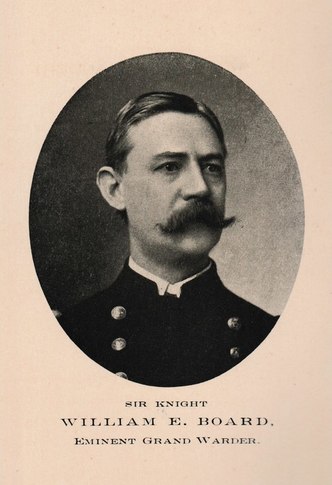 My maternal great-grandfather, William Ellery Board (1862-1918), father of the primary character in my novel, in his Knights Templar uniform. My maternal great-grandfather, William Ellery Board (1862-1918), father of the primary character in my novel, in his Knights Templar uniform. Recently I’ve been struggling with how to create a distinctive voice for my maternal grandfather, who is at the heart of the novel I’m working on. I’ve taken a new approach this last week, and I hope to learn in a few days whether I’m on the right track. Developing characters that readers will care about is a challenge for all writers, but it’s a particular challenge for someone like me who has no experience writing fiction. I’m accustomed to dealing with facts (imagine that) and building stories or arguments around people’s experiences or opinions. In most cases, I have the luxury of interviewing the individuals involved, listening to them, teasing out the details that will make their stories resonate. While I now know many facts about my grandfather’s life, thanks primarily to my good friend and consummate researcher Chuck Camp, I have no idea really what he was like: what he did in his free time, what made him laugh, what demons he battled, what motivated him to make the choices he did. That’s where the “fiction” comes in. I also have no family stories to rely on and no photos. In many ways, he’s still a mystery, and it’s my job to bring him to life on the page. That’s a tall order for a novice. Interestingly, I stumbled rather easily into a voice for his fourth wife, Effie Mae, who inserts her point-of-view in the narrative. (My grandmother was his first wife, at least as far as we know.) Chuck had uncovered substantial information about Effie, and that helped me imagine who she was and what she was like. Whether she was easier for me to create because she’s female, because her background is very distinct, or because I have no familial connection to her is hard to decipher. Perhaps it’s just that her life, fascinating as it was, seems more straightforward and easier to untangle than my grandfather’s. Her choices are easier to understand. Giving voice to an ancestor is a daunting proposition. Of course, I’m creating a fictional representation of my grandfather, and that technically frees me to create the most compelling Lyons Board that I can. On the other hand, his story as we understand it is both highly peculiar and universal, as any good story is, and I really want to do that story justice. Meanwhile, the more I dig and the more I ponder what led him down the paths he chose, the more I recognize that I have his blood. At times it’s almost eerie how similar we seem. So I’ll keep plugging. Writing is a process, and for me that process involves a steep learning curve. But I’m eager to share his story with others, and I hope that will motivate me to wrestle with every obstacle that threatens to silence its voicing.
2 Comments
 A bridge crossing Ralston Creek in Hickory Hill Park, Iowa City. Photo by Bill Whittaker. A bridge crossing Ralston Creek in Hickory Hill Park, Iowa City. Photo by Bill Whittaker. After reading The Last Resort, Bob Patrick of Georgetown, Ky., shared these memories of his youth spent roaming the fields near his home in Iowa City. If you would like to share your reflections about the book, contact us here. Reading the book reminded me of my own father who spent a lot of time outdoors in northwest Iowa up until high school. Born in 1913, he completed college and dental school before WWII, when he served in the Army Air Corps as a dentist, all of it stateside. He returned to Iowa City to establish a dental practice. He died in 1953. The Last Resort also brought to mind memories of hiking with my friends along Ralston Creek, which flows through Iowa City on its way to the Iowa River. There were about five of us, and this all took place when we were in middle school, possibly freshmen in high school. We did not have guns (the turtle population had nothing to fear) and there was no cabin. But on weekends we would hike along the creek to the north through farmland toward its source. We would fish for crawfish, catch the occasional frog. Once I found the upper jaw of a squirrel, which I kept for a number of years. Sometimes we would build small campfires using dried grass and twigs. We even hiked in the winter, wearing galoshes and parkas, being careful not to break through the ice and get a "shoe full" of cold water. During one Christmas school break on one of these hikes, my brother and I cut down a small scrub pine, perhaps 2 feet tall, and carried it back home, where we put it in some type of pot. My mother allowed us to place it in a front window and decorate it with Christmas ornaments. I remember the needles were quite sharp, making it difficult to decorate. [Pud Goodlett] had that Jeffersonian trait of not only noticing the environment around him, but writing down what he saw. His field notes for his publications were, no doubt, even more detailed than his journal observations in the book. And I would imagine he retained a sort of practical outlook often found in people who grew up in small towns and more rural settings. 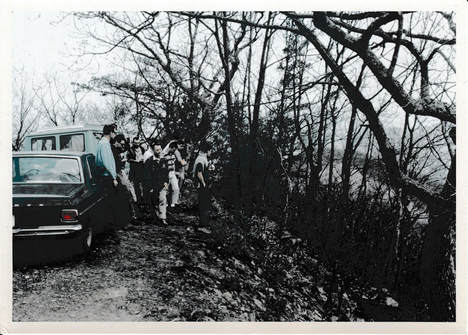 Pud Goodlett (at center in flannel shirt) and some students gather beside the pale green 1965 Dodge A100 van northeast of Reddish Knob on the border of West Virginia and Virginia, between Seneca Rocks, W.Va., and Harrisonburg, Va., May 21, 1966. This is near areas my husband and I loved to visit in our 1990 VW Vanagon. Pud Goodlett (at center in flannel shirt) and some students gather beside the pale green 1965 Dodge A100 van northeast of Reddish Knob on the border of West Virginia and Virginia, between Seneca Rocks, W.Va., and Harrisonburg, Va., May 21, 1966. This is near areas my husband and I loved to visit in our 1990 VW Vanagon. In September 1965, my father—then a professor at Johns Hopkins who worked for the U.S. Geological Survey in the summers—contacted a Lawrenceburg cousin about helping him find a vehicle suitable for his field work. Pud and Harold Hanks, a Plymouth/Dodge dealer in Pud’s hometown, exchanged several letters pinning down the vehicle specs, my father’s financial resources, and my father’s dreams. It’s an amazing correspondence between two cousins that reveals both their affection for each other and the business deal they are trying to close. (Thanks to my cousin Dudley Hanks for sharing these letters with me.) Ultimately, my father settled on a Dodge A100 Sportsman Wagon outfitted with a sink, stove, mini-fridge, table and bench seats, and an elevating camper top that allowed it to sleep four comfortably. He wrote to Harold: “We need a dual-purpose car at this point. I can use an A100 or camper for field work, and if we ever do a tour of the U.S. it will have to be in the next few years. The girls are growing up, and after the teen age nuttiness hits them they won’t care about being with us. Most of all I need a van for next summer’s travel to Plattsburgh. Our Valiant looked like Kaiser Bill on a colt this summer. An ordinary station wagon won’t hold much more and is impossible for field work.” We had already spent one summer as a family in a tiny summer house on the shore of Lake Champlain near Plattsburgh, N.Y., as my father did field work there with Charlie Denny and others. Pud would have his camper van in time for the second summer of field work in 1966. Unfortunately, the family trip out west, discussed as a possibility for the summer of 1967, never happened. Pud died April 1 of that year After he died, my mother had to decide what to do with the camper. We had enjoyed a few family outings and camping trips, and there were obvious emotional attachments that made the decision a tough one for her. Ultimately, however, she decided she wasn’t fully comfortable driving the truck-like vehicle and it was hard to justify keeping it. I don’t know the details of how the sale transpired, but she was able to transfer ownership to someone who took it to the Philippines to use as a mobile medical van. As much as we missed that van and the memories it represented, we could usually assuage ourselves with the thought that it was being used for a much higher purpose in another corner of the world. In some ways, that Dodge camper van served the same purpose for my dad as Thomas, the 1925 Ford Model T truck he relied on for trips to Salt River as a young man. The old truck could haul everything the boys needed to camp in the woods: fishing poles and tackle, rifles, flashlights, food, blankets. It served as both practical transportation and emotional anchor to a place. Those who knew my dad in the late ‘30s and early ‘40s remember that truck. Those who knew my dad in the mid ‘60s remember that van. In 1990, my husband and I bought a VW camper van that was nearly identical in amenities to the van my family had had in the mid-1960s. It was a sentimental purchase, to be sure, but we enjoyed numerous camping trips and biking adventures in Kentucky, Virginia, West Virginia, and North Carolina, trudging up the mountains at 40 mph. A few years ago we finally ceded it to a VW enthusiast who was better able to care for it. These types of vans have enjoyed a popular resurgence among counterculture individualists and minimalists escaping the crush of our material world. Recently, my husband happened to catch an episode of the Velocity network’s “Wheeler Dealers” about a 1965 Dodge A100 Van—the very same sickly green color with the same slant six 140 hp engine and 3-speed manual transmission as our Dodge camper van. Inspired by the possibilities the 50-year-old van offered, the host and his technical crew successfully converted it into a 21st-century California surfmobile. (Watch the full episode here.)
There it was, the van of my childhood, once again fueling someone else’s dreams. 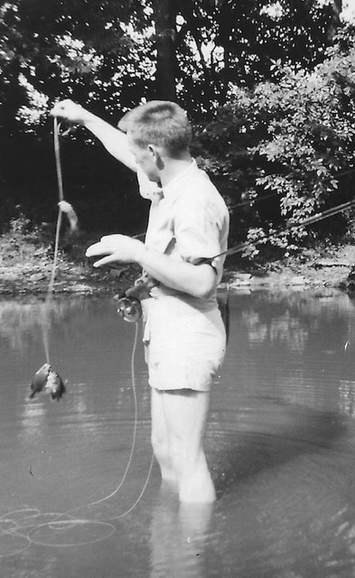 Pud Goodlett continued to fish Salt River on his return from the war in Europe. Pud Goodlett continued to fish Salt River on his return from the war in Europe. [Following is another guest blog by the author of the Introduction to The Last Resort, David Hoefer. I invite other readers to share their thoughts about The Last Resort for future blog posts. You can contact me here.] When I first began to fish a few years ago, I was surprised at how formulaic it was. I don’t mean that fishing isn’t challenging and fun—it can be plenty of both, though not always at the same time—but that the equipment and techniques involved seemed highly codified and very attuned to time and place. A good angler uses certain rods, reels, baits, and casts to catch particular fish in particular circumstances. That’s why I was surprised again when I read John Goodlett’s journal only to find that he and the boys of The Last Resort didn’t give two hoots and a holler about the sacred categories of fishing. For one thing, despite mostly targeting smallmouth bass, Pud’s tackle seems to change constantly, possibly based on what was available in local shops. For another, he mixes casting and fly-rodding setups, which, to hear some tell it, approaches the status of a cardinal sin. Apparently during the mid-1940s procedural integrity was less of a concern; one used what worked, as worked out by experiment. All of which leads to an interesting question: what changed? Has our collective knowledge of the sporting environment risen so dramatically that we can support a highly specialized economy of fishing products and brands? Or are all the exacting methods, tackle, and accessories merely a capitalist ploy to relieve our wallets and purses of excess weight? I suspect that a truthful explanation includes a little of both, and probably some other besides. |
Details
Archives
June 2023
Categories
All
|

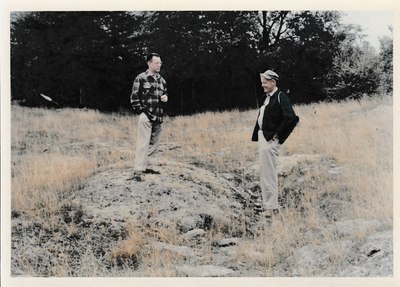
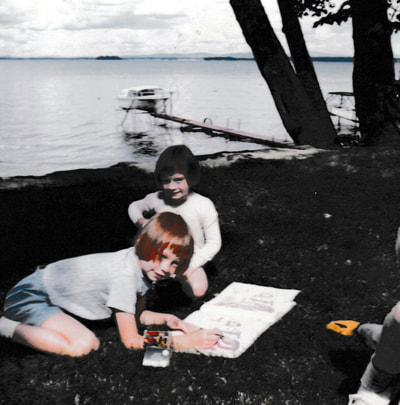
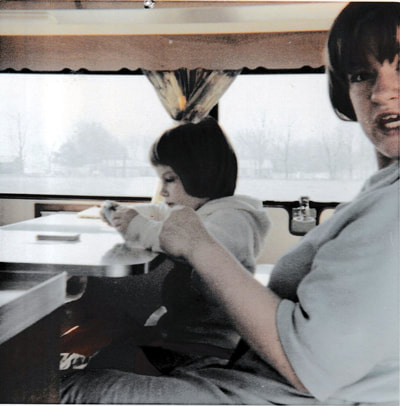
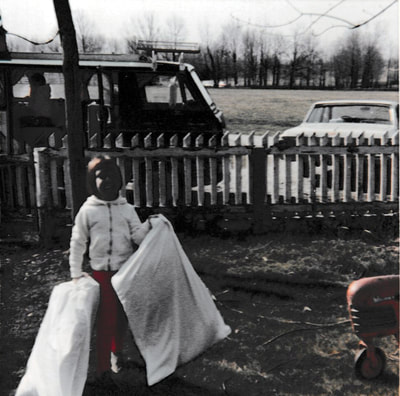
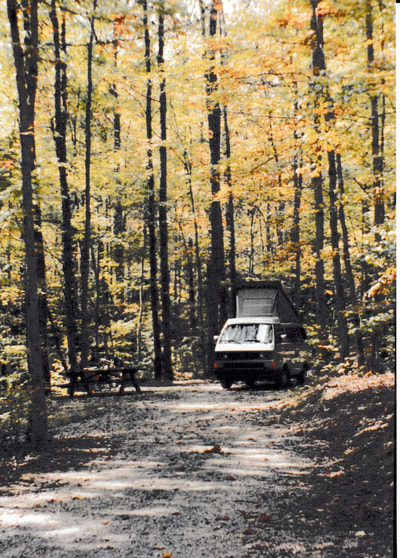
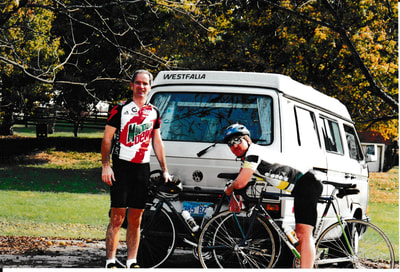

 RSS Feed
RSS Feed